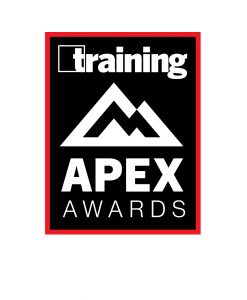
IT staffing and services firm Dexian’s Recruiter to Sales program aims to grow revenue organically by attracting, developing, and retaining salespeople to increase sales headcount. New recruiter candidates are screened for attributes essential to a successful salesperson and guided through the Develop and Advance (D&A) career path to the sales and mentorship programs.
Top sales leaders worked with T&D and HR to define a set of competencies and skills needed to be successful in sales. T&D then wrote these into behavioral terms and designed online courses. The resulting Sales Journey provides guidance and support to salespeople and exemplifies Dexian’s culture every day.
Program Details
The two-year Recruiter to Sales program is divided into 4 Phases that focus on the company’s training philosophy of “See One, Do One, Teach One”:
- Phase 1: See One/Do One: Obtain Knowledge (0-4 months)
- Phase 2: Do One: Retrieve and Apply (4-12 months)
- Phase 3: Do One: Retrieve and Apply (12-18 months)
- Phase 4: Teach One: Mentor and Develop Others (18-24 months)
Each participant is mentored by a salesperson certified by Dexian’s Mentor Development program. All senior salespeople are required to mentor/guide their office program participants. A detailed manual provides mentors a comprehensive guide anchored by an online curriculum, training structure, and activities to engage participants in repeated spaced practice activities. The curriculum includes customized weekly 15-minute online courses driving mentor/mentee discussion, containing open-ended questions on application of introduced skills.
Weekly mentor/mentee meetings are driven by four elements:
- How the participant is applying the training from that week’s course
- Feedback from client meeting shadows and review of strengths/weaknesses from the feedback form
- Reviewing sales journal entries based on specific questions—lessons learned/improvement
- Q&A and self-reflection from their journal
Last year, T&D replaced a role-playing software tool with an innovative way to use Microsoft Teams and the company’s learning management system (LMS). Participants record their sales pitches and role-plays on Teams. The grader gets an automated e-mail prompting them to grade the recorded role-play, which also is posted to Teams for program coordinators to grade and repost for peer learning. Graders use a custom-made, on-the-job, competency-based rubric observation tool in the LMS to evaluate the roles-plays and sales pitches. This must be completed each week for program participants to pass that week and creates an ongoing record of participants’ progress, providing mentors with reports on competencies participants need help with.
Repeated spaced practice of skills is achieved through meetings shadowed by the mentor, evaluated with a feedback form/assessment tool, using business metrics to identify participants’ weaknesses and creating a plan for weekly learning boosts. Discussion groups/communities in Teams allow participants to share and celebrate successes.
Results
Some 75 percent of the enterprise salesforce has been trained/promoted from the Introduction to Recruiting (ITR) program. Last year, 100 percent of Dexian’s Sales Journey participants were promoted from its recruiting ranks, with no outside hires. Turnover in all sales roles beat the company’s target of 25 percent.
Graduates of the ITS program and Sales Journey Phase 1 achieved success faster with their first sale and met profitability metrics 1.5 months sooner than previous new hires. Some 75 percent of new accounts in the last two years were broken by ITS graduates. Graduates doubled their revenue in less than one-third of the time it took to hit their initial sales goal.



